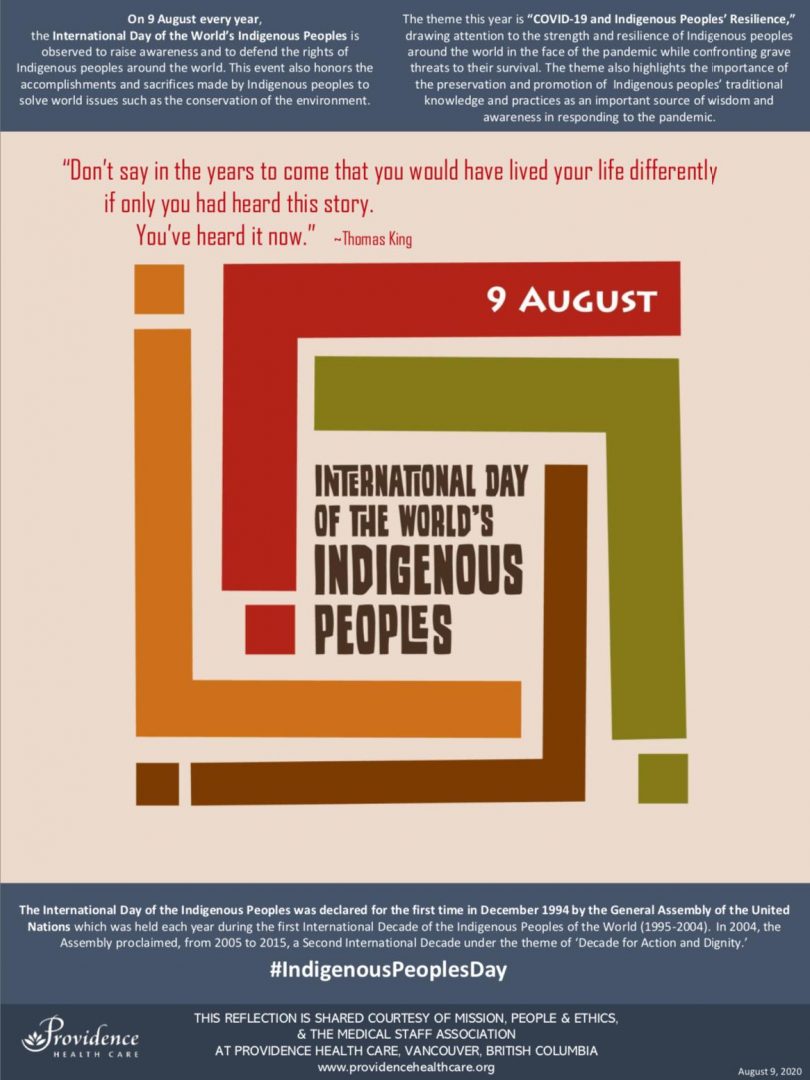August 9 is International Day of the World’s Indigenous Peoples. Although this is one day marked in our calendars, it is important to celebrate the history and resiliency of Indigenous Peoples 365 days of the year.
Together, we are learning. We continue to grow our commitment and understanding of the process of Truth and Reconciliation with Indigenous Peoples — specifically, our collective work towards Indigenous cultural safety and the practice of cultural humility.
As Canadians, it is our personal responsibility to read and learn about historical, current, and ongoing colonization of Indigenous Peoples in Canada — an opportunity to practice cultural humility and take a personal action towards reconciliation. It is also our responsibility to be educated on the inequities – in health, economic, education, child welfare and justice – that Indigenous Peoples experience as a direct result of colonization.
By doing this, we can take action to become better allies, support Indigenous Peoples, and work to dismantle systems that perpetuate institutional anti-Indigenous racism, discrimination and stigma. It is taking personal responsibility, being open to change and humble in our learning, and doing the work – that is most important.
This Sunday, on International Day of the World’s Indigenous Peoples (August 9), we encourage you to take a personal action towards reconciliation and acknowledge the voice and resiliency of Indigenous Peoples. Here are a few ideas from CBC Canada to help you get started:
1. Pick up a book
Take the opportunity to practice cultural humility and educate oneself about the Canadian context, i.e., the Indian Act, Residential Schools, ’60s Scoop, Millennial Scoop, and the national inquiry into Missing and Murdered Indigenous Women and Girls (MMIWG). Here are a few suggestions of books:
Books for adults:
- Residential School/Project of the Heart | Strong Nations
- Residential Schools reading list | Indigo
- 108 Indigenous writers to check out | CBC Books
- 15 memoirs by Indigenous writers you need to read | CBC Books
- #IndigenousReads | Government of Canada
- Indigenous Stories reading list | Indigo
Books to read with your kids:
- 10 books about residential schools to read with your kids | CBC Indigenous
- 17 beautiful Indigenous comic books and video games for kids | CBC Parents
- 11 books to teach kids about residential schools | Today’s Parent
2. Support emerging Indigenous artists
Here in British Columbia, we have many talented and creative Indigenous artists who are creating beautiful pieces of art.
Here are a few artists to check out:
- Indigenous innovators
- 10 Indigenous artists forging community ties
- Indigenous artists use craft to change perspectives
3. Watch a film and/or documentary
- ‘The Eyes of Children’
- We were children
- Sleeping Children Awake
- Stolen Children: Residential School Survivors Tell Their Stories
4. Listen to a podcast on Indigenous issues
- Residential Schools. We haven’t even begun to talk about what happened | Canadaland, 2015
- Retracing my mother’s escape from residential school | CBC Radio, 2017
- The Henceforward: Considers relationships between Indigenous Peoples and Black Peoples on Turtle Island.
- Native Currents: A critical review of what’s happening in Indian Country.
- New Fire: From remote reserves to bustling big cities, Lisa Charleyboy brings you to the surprising heart of the conversations important to Indigenous youth today.
- A Tribe Called Geek: Indigenerdity for the Geeks at the Powwow.
- Media Indigena: A weekly Indigenous current affairs roundtable, hosted by Rick Harp.
- Missing & Murdered: Who Killed Alberta Williams
- Missing & Murdered: Finding Cleo: It’s a mystery her family has been trying to unravel for decades after the young Cree girl was apprehended by child welfare workers in Saskatchewan in the 1970s.
- 60 Years of Indigenous Music Game Changers |CBC Music
- Reclaimed: A weekly series that explores the many worlds of contemporary Indigenous music | CBC Music
- Indigenous Voices Spotify playlist | CBC Saskatchewan
5. Most importantly, work towards meaningful allyship
Listen. Read. Reflect. Ask questions. Have those difficult conversations with friends and family.
On International Day of the World’s Indigenous Peoples – and every day – our commitment to reconciliation and our daily practice of cultural humility to ensure Indigenous cultural safety at Providence Health Care is part of the mission-driven commitment towards social justice and serving the most vulnerable with compassion, dignity and respect. To learn more about Providence’s Commitment to Cultural Safety, see the Declaration here.





